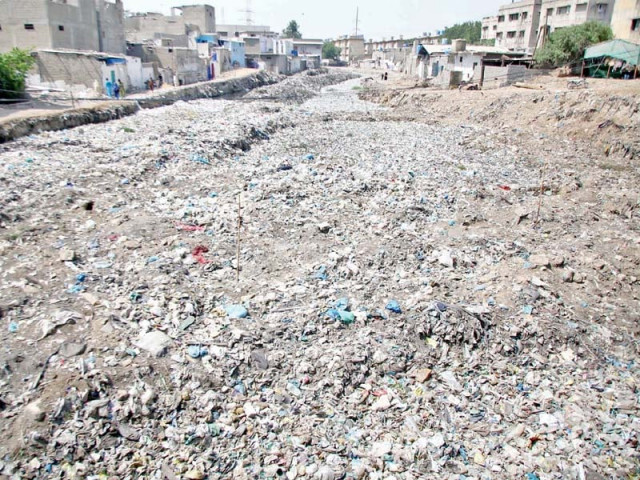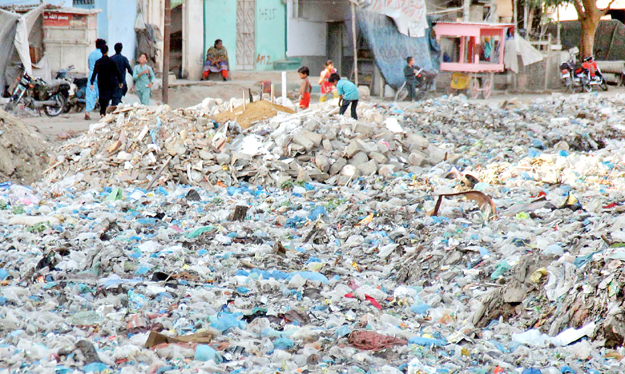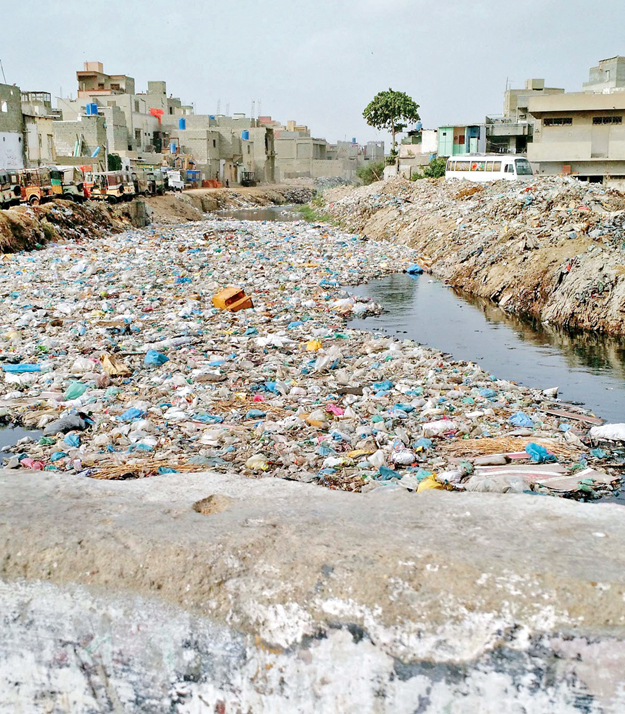At monsoon’s mercy: Karachi drains being cleaned at snail’s pace
Over 550 drains in the metropolis are either clogged or encroached upon

Several of Karachi’s drains remain clogged despite efforts initiated supposedly in time for the monsoon. The accumulation of waste dumped by citizens, govt and private institutions is causing the storm-water drains to choke all over the city, says one KMC official. PHOTOS: NNI
With the rainy season virtually upon us, the city administration has sprung into action to clear the blocked drains. But like the several development works in the metropolis, efforts to unclog the drains are progressing at a snail’s pace.
According to details gathered by The Express Tribune, all of Karachi’s more than 550 rain drains are either clogged or encroached upon and need to be cleared urgently before heavy rains lash the city.
Monsoon plantation drive: IMC to plant 300,000 trees around the city
“The accumulation of waste dumped by citizens, government and private institutions is causing the storm-water drains to choke all over the city,” said a Karachi Metropolitan Corporation (KMC) officer, speaking on condition of anonymity. He blamed massive encroachments for the city’s choked drainage system.

“For over four decades, encroachments have prevented the smooth flow of rainwater. This causes the drains to choke and subsequently, parts of the city are flooded.”
Slum-dwellers are not the only offenders in this case. Ironically, those responsible for running the city’s administration, including the KMC, district municipal corporations, cantonment boards and even the provincial government are responsible for obstructing rain drains. “In most cases, the city administration has built government offices, markets and parking sites on numerous stormwater drains,” the officer added.
City and district authorities seem to be unprepared for the heavy rains despite the buzz of monsoon growing louder with the Pakistan Meteorological Department (PMD) releasing its forecast for the season. “Staff at the municipal bodies are not interested in clearing the nullahs, primarily due to lack of interest,” an official familiar with the matter said.
Commenting on the efforts to clear the city’s clogged storm-water drains, District Central Municipal Corporation Chairman Rehan Hashmi said the ongoing cleanup work will be completed in a week. “The rainwater drains are spread over 35km within the Central district limits. The management, with its limited resources, has completed 70 per cent of the cleanup work and the remaining will be done in a week,” he said.
Experts believe the accumulation of solid waste chokes the city’s natural waterways and the lack of regular cleaning results in blockages that cause the rainwater to spill over, creating problems for the citizens. Besides, the construction of markets and other establishments over drains, solid waste dumped into the drainage system is a serious obstacle in the passage of rainwater.

Encroachments
With no protective walls present around the stormwater drains of the city, the drainage system remains vulnerable to the ever-present threat of encroachment. Within the last year alone, the city administration has removed encroachments on Gujjar nullah, City nullah, Mehmoodabad nullah, Nehr-e-Khayyam and Akbar Road nullahs. The encroachments at Soldier Bazaar nullah, Chakor nullah, and Kalri nullah have also reportedly been removed.
As per official claims, the anti-encroachment drive has restored a number of nullahs. However, the provincial government’s secretariat building, the ombudsman’s offices and a number of government hospitals built on the drains are yet to be removed.
According to an independent estimate, 90 per cent of encroachments are still present on the storm-water drains due to which the drains could not be completely cleaned.
Cleanup operation versus waste
Since June 2018, municipal bodies have cleaned 38 nullahs on the directives of the Supreme Court-mandated water commission. Over the past 12 months, Rs1.2 billion has been dished out for the cleaning and desilting of storm-water drains in various parts of the city.
Unfortunately, the absence of a system to manage solid waste that finds its way into these channels continue to be the number one reason behind Karachi’s choked drainage system. “Slum dwellers continue to dump waste into the drainage system. This will not change without a proper waste management system,” a source familiar with the matter said.
Drain pathway
According to details, there are small and big storm-water drains scattered all over the city. The storm-water drains carry rainwater into Lyari and Malir rivers, from where the rainwater flows into the Arabian Sea.
Over the past few decades, even moderate and mild rains have brought life to a grinding halt in Karachi. The streets are inundated with rainwater and it takes weeks to clean certain areas.
According to urban planners, the city had a remarkable sewerage system until 1980. Natural rain drains in the city were connected to Malir and Lyari rivers, which would smoothly drain rainwater without flooding the city.
Now, rainwater pooling on the city roads takes a long time to drain because most stormwater drains in the city are choked with silt and garbage if not obstructed by encroachment.
Too little, too late
Six municipal corporations in the city have initiated the cleaning operation to clear choked nullahs. Although the cleaning operation is underway at several points, officials may not be able to complete the task before rains hit Karachi.
Bracing monsoon season: Chaos as rain continues to lash parts of Punjab
Some of the worst storm-water drains are situated in the Korangi district, known as Karachi’s industrial hub. The storm-water drains in the area are clogged with heaps of garbage at various points.
The task of cleaning the nullahs in UC-1, UC -6, UC -7 and UC- 9 is somewhat slow at the moment. In North Nazimabad and New Karachi, open drains serve as a dumping ground for the resident. They are obstructed with heaps of garbage at various points.
Similarly, rainwater drains in Liaquatabad, a densely populated area surrounded by several commercial zones has also been choked with garbage, making it impossible to clean them.
Published in The Express Tribune, July 27th, 2019.



















COMMENTS
Comments are moderated and generally will be posted if they are on-topic and not abusive.
For more information, please see our Comments FAQ